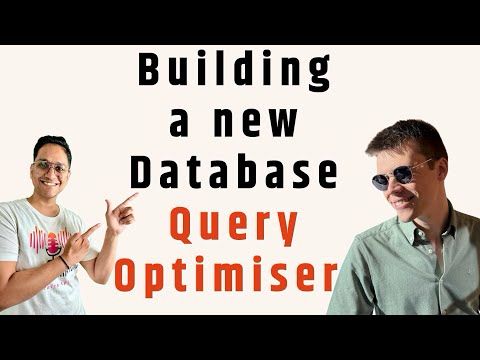I never thought about usage of my face and voice for training tbh. And I don’t think I can control that too much.
Part of the job I guess.
04.07.2025 07:16 — 👍 2 🔁 0 💬 0 📌 0
Thanks @qianli.dev
Challenges faced:
- Remote recording is sometimes challenging, but these days there are many tools like Riverside, Descript make it really easy.
- Not getting demotivated is a challenge. But ultimately you start enjoying the process and engagement becomes a side effect.
04.07.2025 07:14 — 👍 3 🔁 1 💬 1 📌 0
1/12. I'm excited to share our latest technical blog post on ParadeDB.
After a brief hiatus focused on transforming ParadeDB into an enterprise-ready database, expect to hear a lot more from us.
Today's post: How ParadeDB built an LSM on top of Postgres block storage. 🧵
01.07.2025 16:22 — 👍 16 🔁 7 💬 1 📌 0
YouTube video by The Geek Narrator
LSM Trees: How does it all work?
How do LSM trees work?
Finally created a light board video. I hope you like it 🙏🏻
LSM Trees: How does it all work?
youtu.be/CizxYuq-z6E
01.07.2025 14:37 — 👍 5 🔁 0 💬 0 📌 0
👏 thanks
16.06.2025 19:10 — 👍 2 🔁 0 💬 0 📌 0
Agreed. Payments are really complicated and defining the states in a simple post like this is impossible. 😅 it was totally a simplistic model to share the idea of thinking in terms of state.
16.06.2025 15:35 — 👍 2 🔁 0 💬 1 📌 0
Absolutely. Cannot agree more
15.06.2025 16:44 — 👍 1 🔁 0 💬 1 📌 0
Another advantage to designing systems as state machines: automated testing and even verification becomes dramatically easier.
15.06.2025 16:02 — 👍 3 🔁 1 💬 1 📌 0
You're not just writing code. You're orchestrating state transitions at every level - aggregating them, filtering them, transforming them into something users can consume.
Follow @thegeeknarrator.bsky.social if you are interested in databases, distributed systems and software engineering tips.
15.06.2025 08:33 — 👍 0 🔁 0 💬 1 📌 0
Everything is a state machine - from Netflix's video player (LOADING → PLAYING → PAUSED → ERROR) to your payment processing (PENDING → AUTHORIZED → SETTLED → FAILED).
Even your individual functions have states. Even the bits in memory have states (0 or 1).
15.06.2025 08:33 — 👍 0 🔁 0 💬 1 📌 1
Then, do the following and find more states:
Think about what happens when things fail
Think about user actions that can happen simultaneously
Think about external events and timeouts
15.06.2025 08:33 — 👍 0 🔁 0 💬 1 📌 0
Modelling your system explicitly is the bottom line.
How do you know you are modelling the right states?
Try to find:
"boolean flags scattered everywhere"
"nested if-else chains"
"this should never happen" comments
"works-on-my-machine" bugs
"race-condition" issues
"impossible-to-reproduce" errors
15.06.2025 08:33 — 👍 0 🔁 0 💬 1 📌 0
It can help you create a simple model of your system that you can prototype and test.
In my experience it brings predictable behaviour and keeps away impossible system states.
15.06.2025 08:33 — 👍 1 🔁 0 💬 1 📌 0
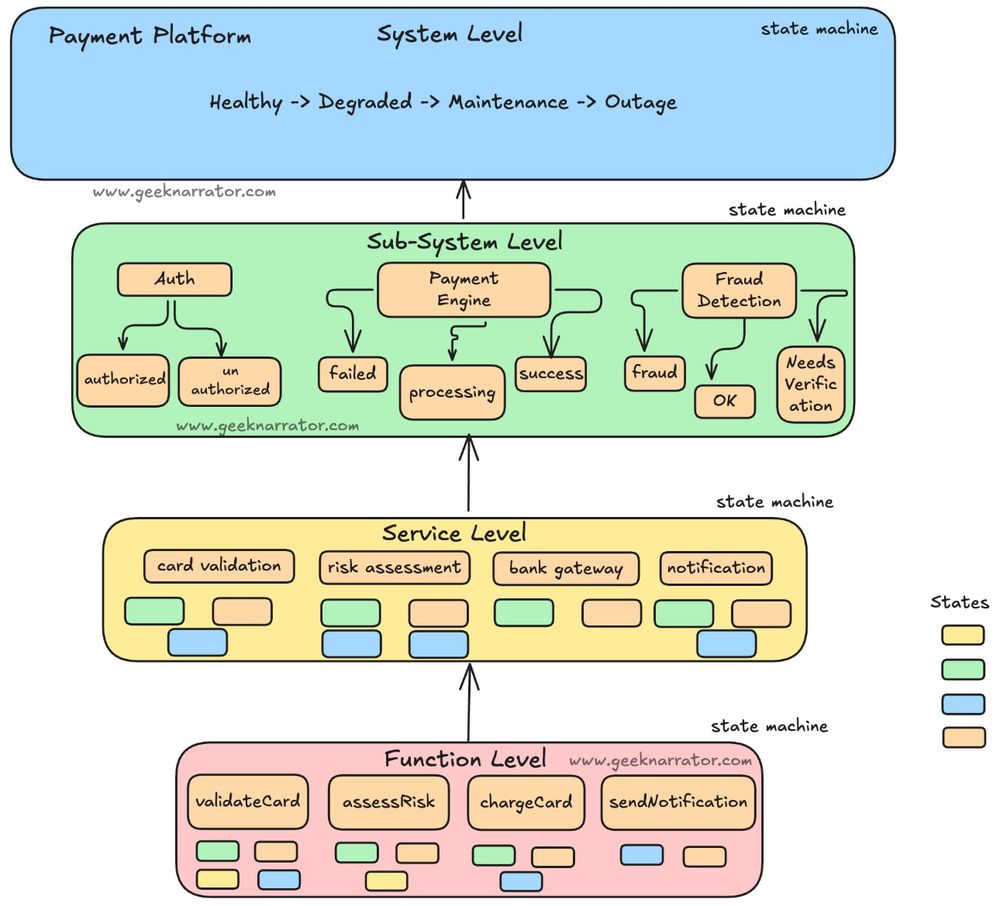
What is State Machine thinking and how do I use it (practically)?
State machine thinking is one of the best ways to build reliable software. The idea is to break down complex systems into discrete states and explicit transitions between them.
15.06.2025 08:33 — 👍 6 🔁 1 💬 1 📌 0
When you do this, in my experience you pretty much end up being on the right track and make good progress.
14.06.2025 11:59 — 👍 0 🔁 0 💬 0 📌 0
But it will take practice and you will find yourself stuck, which is completely normal.
Then, do the following and find more questions:
- Thinking about evidences or ways of testing for your findings
- Think about alternative perspectives
- Think about consequences and implications
14.06.2025 11:59 — 👍 0 🔁 0 💬 1 📌 0
How do you know you are asking the right questions?
Try to find
- “assumptions”
- “stereotypes”
- “dogmas”
- “because-someone-said-so”,
- “because-its-written-in-a-book”
- “its-obvious”
kinda statements and challenge them. When you try to challenge them you pretty much ask the right questions.
14.06.2025 11:59 — 👍 0 🔁 0 💬 1 📌 0
It takes a lot of thinking and practice and may also feel unproductive at the beginning (although it’s fun).
In my experience it brings creative solutions and keeps away unnecessary complexity.
Asking the right and enough questions is the bottom line.
14.06.2025 11:59 — 👍 0 🔁 0 💬 1 📌 0
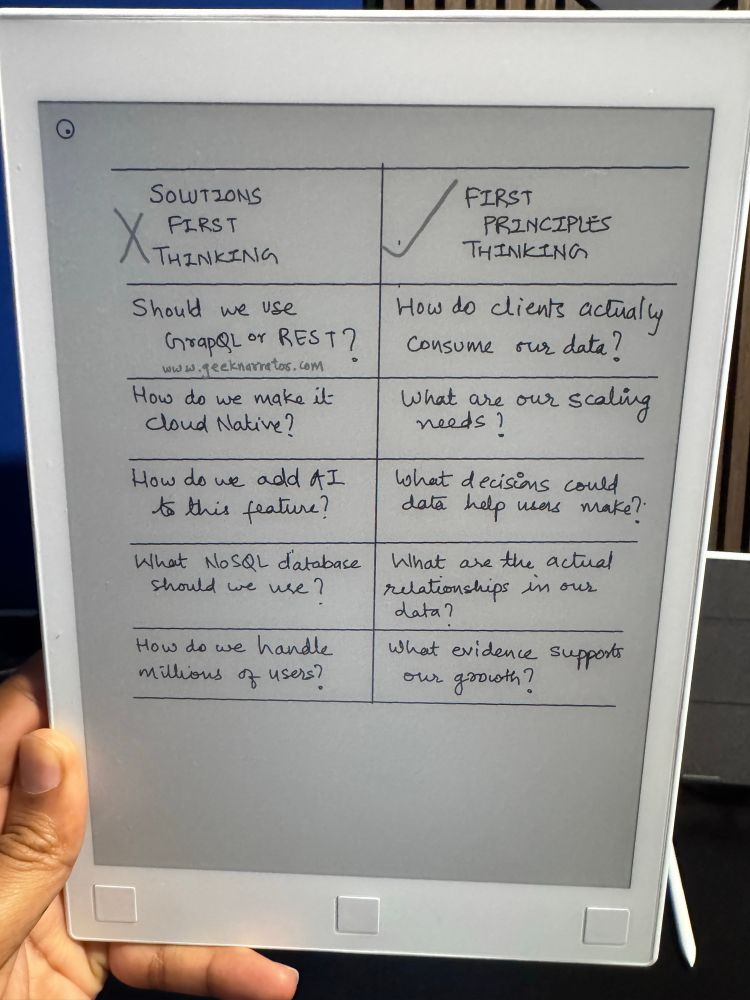
What is First principles thinking and how do I use it (practically) ?👇
First-principles thinking is one of the best ways to tackle complex problems.
The idea is to break down complex problems into primitive elements and then reassemble the problem from scratch.
14.06.2025 11:59 — 👍 6 🔁 1 💬 1 📌 1
I have had an even better experience with Gemini though. Did you try that?
14.06.2025 11:56 — 👍 0 🔁 0 💬 0 📌 0
Small enough service is a micro-service.
Large enough language model is a Large Language Model.
Naming is a NP-hard problem.
13.06.2025 16:00 — 👍 0 🔁 1 💬 0 📌 0
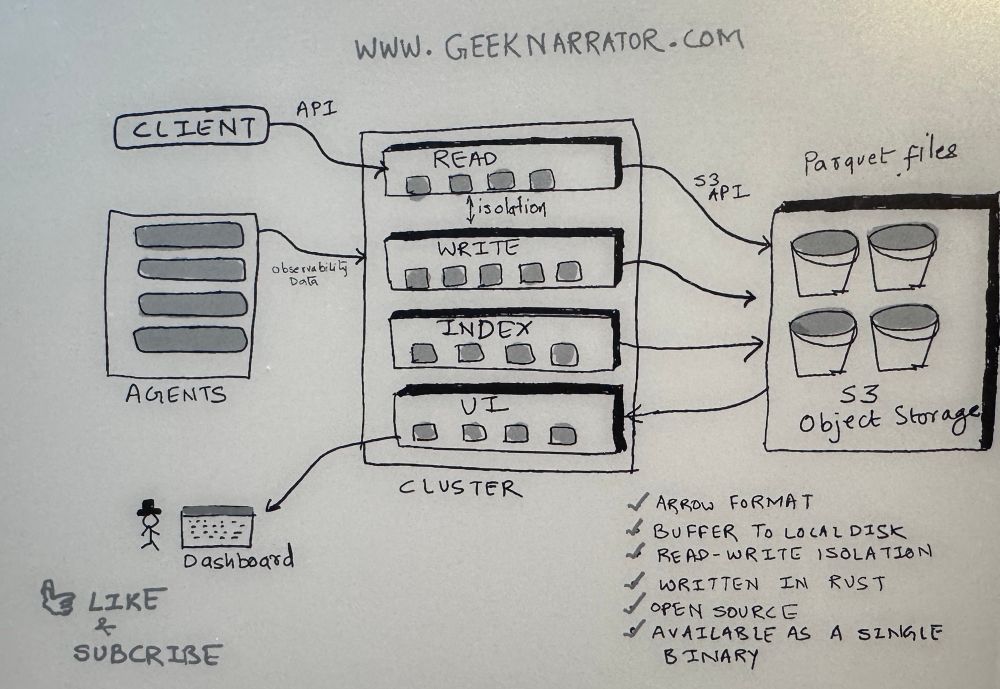
Here is a sketch of how a solid observability platform built on top of object storage would look like this 👇
And guess what, Parseable is built exactly like that. All the good stuff that makes a system fast, reliable and highly scalable.
New episode 🚀
youtu.be/MugLlrf5E_g
11.06.2025 16:02 — 👍 5 🔁 0 💬 0 📌 0
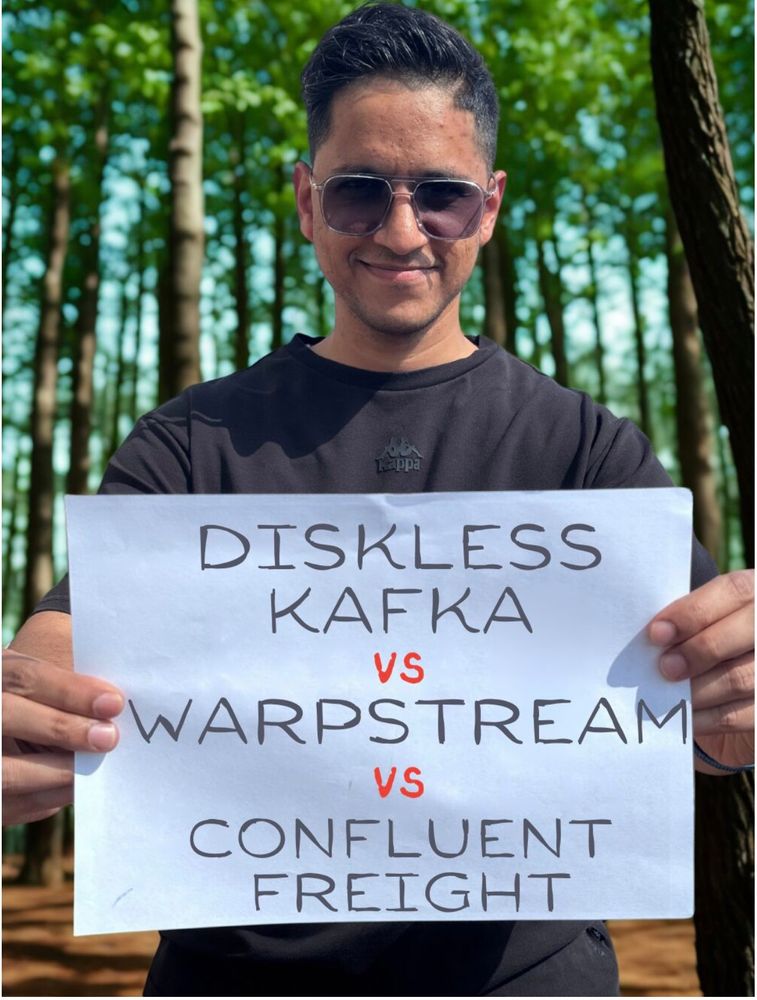
Diskless Kafka?
But why?
Why is it important for Kafka ecosystem ?
How does it compare with existing revolutionary technologies?
Blogged a comparison between Diskless Kafka, WarpStream and Confluent Freight. www.geeknarrator.com/blog/diskles...
09.06.2025 19:20 — 👍 2 🔁 2 💬 0 📌 0

Diskless Kafka?
But why?
Why is it important for Kafka ecosystem ?
How does it compare with existing revolutionary technologies?
Blogged a comparison between Diskless Kafka, WarpStream and Confluent Freight. www.geeknarrator.com/blog/diskles...
09.06.2025 19:20 — 👍 2 🔁 2 💬 0 📌 0

DUPLICATE events and painfully SLOW joins are a real and painful problems in the world of stream processing and realtime analytics.
But why there hasn't been a simple, easy and fast solution for these problems that just works with the hassle?
08.05.2025 08:18 — 👍 0 🔁 1 💬 1 📌 0
YouTube video by The Geek Narrator
Deduplication and Joins - easy, simple and fast with GlassFlow
Well, there is now. GlassFlow is doing that exactly in an elegant manner.
Just dropped a video on explaining why GlassFlow is super cool and why existing solutions have limitations. Checkout the link below for the video
youtu.be/Pr-OGNSFEqQ
08.05.2025 08:18 — 👍 2 🔁 0 💬 0 📌 0

DUPLICATE events and painfully SLOW joins are a real and painful problems in the world of stream processing and realtime analytics.
But why there hasn't been a simple, easy and fast solution for these problems that just works with the hassle?
08.05.2025 08:18 — 👍 0 🔁 1 💬 1 📌 0
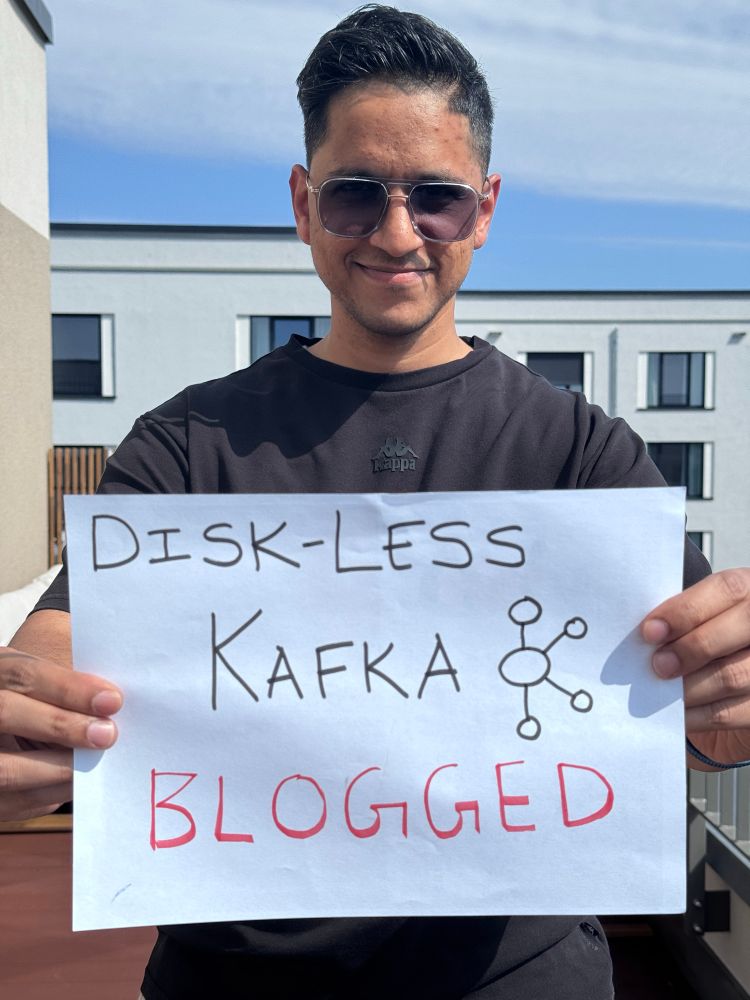
BLOGGED 🎉 - Diskless Kafka KIP-1150
Wrote a detailed blog on why I think diskless Kafka is going to be HUGE.
Do check it out here:
www.geeknarrator.com/blog/diskless-kafka-kip-1150
Thanks Aiven for sponsoring the blog.
03.05.2025 13:31 — 👍 14 🔁 2 💬 0 📌 0
YouTube video by The Geek Narrator
Building a new Database Query Optimiser - @cmu
And honestly a lot more.. Now do me a favour and like, repost this post for the love of databases.
check out the link below 👇
Building a new Database Query Optimiser
youtu.be/neaGVc_VvMU
23.04.2025 12:37 — 👍 0 🔁 0 💬 0 📌 0
Redpanda is a simple, high throughput, and cost-efficient streaming data platform that's compatible with Kafka® APIs without the Kafka complexity.
WarpStream, the Kafka-compatible data streaming platform, is now a part of @confluent.io. We’re joining forces to advance next-gen BYOC data streaming. Learn more at warpstream.com.
CEO @ feldera.com, the incremental compute engine for AI, ML and data teams.
Formerly a systems researcher in distributed systems, databases, cloud, OS, PL, and networking. Sci-fi and gaming nerd.
lalith.in/research
Passionate about compilers & programming languages. GraalVM founder & project lead. VP at Oracle. Expressed opinions are my own. For DM: contact@thomaswue.dev
Tech and pictures of nature. Suffolk, UK
Building distributed systems and data infra.
Previously co-creator of Apache Flink (https://flink.apache.org/),
now building Restate (https://restate.dev/) to make distributed apps more easily resilient and scalable.
Serverless, databases, and serverless databases at AWS. Views my own.
Check out my blog: https://brooker.co.za/blog/
NetBSD Dev | Python Internals, AI, compilers, databases, & performance engineering | https://blog.codingconfessions.com/
Andrew Shieh, curious optimistic pessimist, operations are forever. :this-is-fine: :success-kid: :1000-RPCs-in-a-trenchcoat:
software engineer at @cloudflare.social, prev founder baselime.io, physics grad, aero postgrad
boristane.com
Staff Software Engineer at Meta
Systems engineer @turbopuffer.bsky.social. Former CTO @materialize.com.
engineering at @microsoft.com • tinkering with systems languages, databases and things on the web • musings at http://blog.shrirambalaji.com
Engineering @ AWS – author of http://understandingdistributed.systems
Favorite Buzzwords: Kafka Streams | SlateDB | Stream Processing | Distributed Databases
co-founder @ https://responsive.dev
Distinguished Engineer @ Microsoft 🧐. Creator of NuGet, SignalR and ASP.NET Core, Barbadian 🇧🇧, Tennis Player.
Code | Test | Deploy | Get paged
Data streaming, Machine Learning and BigData Systems
Building @sidequery.dev
Director of Engineering atm.com
nicoritschel.com








